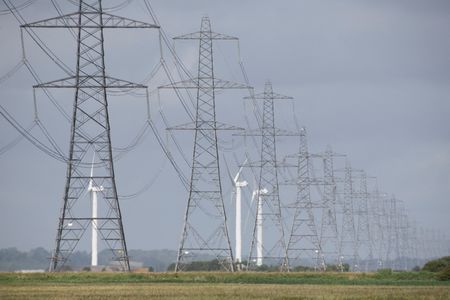By Susanna Twidale
LONDON (Reuters) -Millions of Britons will pay higher energy costs from April after regulator Ofgem said its domestic price cap would rise 6.4% due to soaring wholesale energy prices.
That would be the third consecutive quarterly increase and a blow for the government, which had made reducing energy bills one of its aims. It comes after higher-than-expected inflation figures for January.
Ofgem’s new cap of 1,849 pounds ($2,334.18) a year for average use of electricity and gas is up 111 pounds, or 6.4%, from 1,738 pounds under the previous cap.
The hike is higher than expected, with analysts previously forecasting a rise of around 5%.
Benchmark British gas prices hit a two-year high earlier in February as cold temperatures led to high withdrawals from Britain and Europe’s gas stores and after a deal to supply Russia gas via Ukraine expired at the end of the year.
Wholesale gas and power prices are a major part of the formula Ofgem uses to calculate the price cap.
Britain’s energy minister Ed Miliband said the government was working to cut the country’s reliance on expensive fossil fuels and would increase the number of homes eligible for its Warm Home Discount which offers some people on benefits 150 pounds towards their energy bills each winter.
“Alongside this, the way to deliver energy security and bring down bills for good is to deliver our mission to make Britain a clean energy superpower- with homegrown clean power that we in Britain control,” he said.
Britain has a target to decarbonise its electricity sector by 2030 and cut its use of gas which currently provides around a third of its power.
Campaign groups called on the government to offer more support for vulnerable households, such as launching a social tariff or a help-to-repay scheme for customers in debt.
Miliband said the government would work with Ofgem to develop a potential debt relief scheme.
Ofgem has said the total of household energy debt hit almost 4 billion pounds last year, and that without intervention, this figure would grow.
Based on current wholesale energy prices, the cap could fall in July to 1,756 pounds a year, analysts at Cornwall Insights forecast, but they warned that volatile markets mean the forecast is likely to change multiple times before the next cap level is set.
($1 = 0.7921 pounds)
(Reporting by Susanna Twidale, additional reporting by Shashwat Awasthi; Editing by Eileen Soreng and Bernadette Baum)











